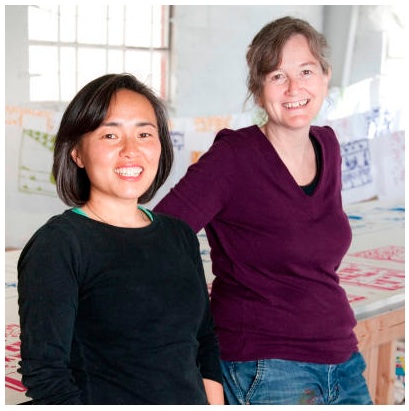By Donna Olmstead / Journal Staff Writer
PUBLISHED: Sunday, August 24, 2014
Two Albuquerque women, who met at their kids’ school, have turned their part-time hobby into Kei & Molly Textiles, a national wholesale and online business.
Without backgrounds in fine art, but with plenty of ingenuity and business savvy, Kei (pronounced Kay) Tsuzuki and Molly Luethi found a unique path to success through thousands of cotton and linen tea towels handprinted with whimsical designs in bold colors.
“It’s a for-profit business. We each invested $500 of our money, but now we both draw a modest salary. We also have super, supportive husbands,” Tsuzuki explains one sunny morning at the textile studio in the International District, near San Mateo and Central SE.
With Luethi on vacation that day, Tsuzuki, 45, had just dropped her kids at school and was gearing up for a busy day.
The product line includes kitchen linens and home and fashion accessories, including scarves printed with similarly vibrant designs.
The textile studio’s model and other craft enterprises like it and their online Etsy stores will be topics in a free series of workshops scheduled at WESST on Broadway NE, beginning Sept. 2, in partnership with Etsy, an e-commerce site for creative entrepreneurs.
A fusion of influences
In their studio, the walls are festooned with recently printed drying towels, strung up like prayer flags.
One design destined for markets in California and Hawaii has an under-the-sea motif in nautical blue with an anchor in the corner and the curling tentacles of an octopus in the center.
A tree of life in a cheery green and laundry fluttering on a clothesline in raspberry red are perennial favorites. New Mexico-themed designs from mission churches to the Very Large Array are also popular. All the ink is water-based.
“We didn’t want to do the typical chile ristra,” Tsuzuki says. “We have a similar aesthetic. We design all our images ourselves, often inspired by what we see in New Mexico as well as by our individual backgrounds.”
Tsuzuki says she is Japanese but grew up in Montréal, Canada, while Luethi is Swiss-American with a Japanese husband and has lived in Tokyo.
While it’s true both women spent some years at home raising children, it’s also true that Tsuzuki graduated from Princeton University and has an MBA from the University of New Mexico, while Luethi graduated from Wellesley and the prestigious Sorbonne in Paris and speaks five languages.
In the beginning
Their products made their debut about two years ago at a holiday craft fair at Bandelier Elementary. “We sold out in an hour. We were in shock. We knew we were on to something.”
But they did their homework, selling at every craft fair they could find and listening closely to what their customers liked and how much they were willing to pay. They took advantage of services at WESST and early in their business launched an Etsy website.
“We used our Etsy store as our website. These days you have to have an online presence,” Tsuzuki says.
The women followed Etsy’s tutorials and soon they were generating national interest. Along with having their products in New Mexico stores, their line is sold in retail stores in 14 states and has been featured in several national magazines, like the July edition of Epicurious.
One secret of their Etsy success is to be as diligent with the store as they are in face-to-face transactions. “We ship out the next day. We keep the Etsy store stocked,” meaning that if they discontinue or run out of a pattern, they take it off their website. They protect their image by reading their reviews and keeping people happy.
Building the business
Tsuzuki also works with the Southwest Creations Collaborative in Albuquerque, a manufacturing social enterprise that provides cutting, sewing and handwork services, while pursuing a larger social mission. They do sewing for the textile company.
“Southwest Creations is a model for us. We are committed to more than our jobs,” Tsuzuki says.
Although Yenisey Cortes, a legal immigrant from Cuba, where she was a dentist, is their sole employee now, they hope to employ 10 to 12 workers in the next five years.
“It’s important for us. We are socially conscious,” Tsuzuki says. “We pay a living wage. We don’t start anyone for less than $10 an hour. We really do have a double bottom line of being both profitable and contributing to our community and the women who we hire.”

